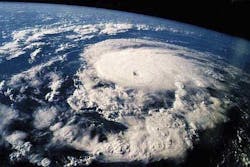Air Force kicks off program to define next-generation weather satellites and sensor payloads
EL SEGUNDO, Calif., 15 June 2012. U.S. Air Force weather satellite experts are asking industry for ideas on developing the next generation of military weather satellites and satellite sensor payloads. Companies have one year to submit white papers on the topic, and only those submitting acceptable ideas will be asked to bid on follow-on contracts.
The Defense Weather Satellite Directorate of the Air Force Space and Missile Systems Center at Los Angeles Air Force Base, Calif., issued a broad agency announcement (FA8803-12-A-0001) last week for the Weather Satellite Follow-On Activities program to define the next-generation Air Force weather satellite, as well as its electro-optical and microwave sensor payloads (story continues below).
The solicitation asks for companies to submit their ideas for a new weather satellite and sensor in white papers due no later than 1 July 2013. After that the Air Force will issue formal requests for proposals (RFP) to companies whose white papers are determined to meet Air Force needs.
In initial phases of development, Air Force officials say they expect to spend $7 million to define the weather satellite itself, $6 million to define its microwave environmental sensor, and as much as $14 million to define its electro-optical/infrared (EO/IR) environmental sensor.
The space-based EO/IR weather sensors should be able to provide detailed imagery of conditions such as cloud cover and layers, cloud top temperature, snow cover, and sea ice. The microwave sensors should be able to measure conditions such as global sea surface wind speed and direction, soil moisture, and snow depth.
Air Force officials say they expect to award several contracts for this phase of development, and prefer to spend no more than $83 million total. Contracts should be for 12 to 15 months.
The project's goal is improve Air Force understanding of weather sensing technologies and capabilities, and set down specifications for potential future Air Force weather satellite programs. Los Angeles Air Force Base is in El Segundo, Calif.
The program's contract specialist is Albert Yeh, who can be reached by e-mail at [email protected], or by phone at 310-653-2397. The contracting officer is Charles Watson, who is available by e-mail at [email protected], or by phone at 310-653-3515. The Ombudsman is James Gill whose phone number is 310-653-1798.
Air Force researchers have set up a bidder's library at http://bd.mcri.com/dwsd/register.aspx for additional information. Users must register before they can access information.
More information is online at https://www.fbo.gov/spg/USAF/AFSC/SMCSMSC/FA8803-12-A-0001/listing.html.
Follow Military & Aerospace Electronics and Avionics Intelligence news updates on Twitter

